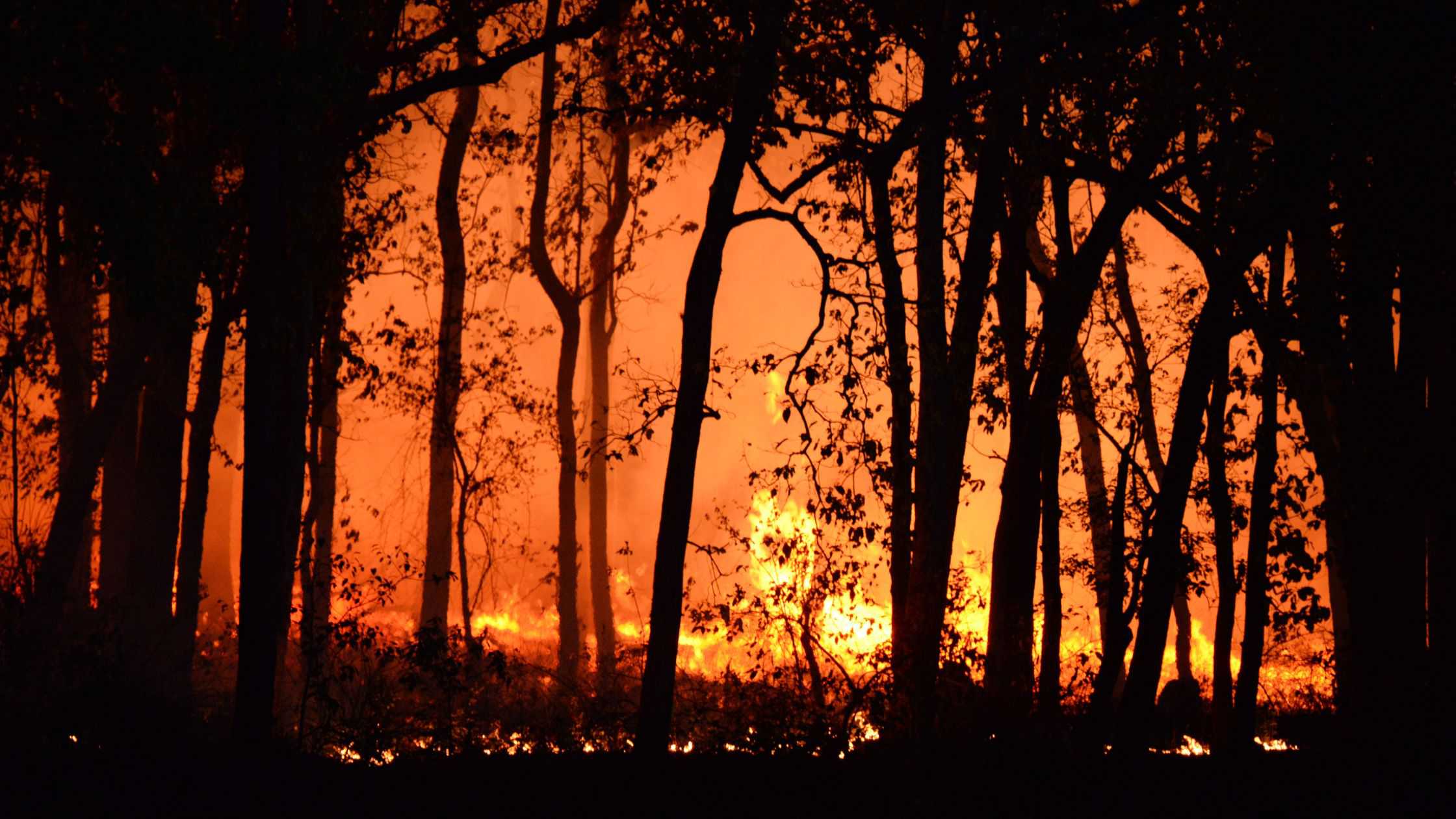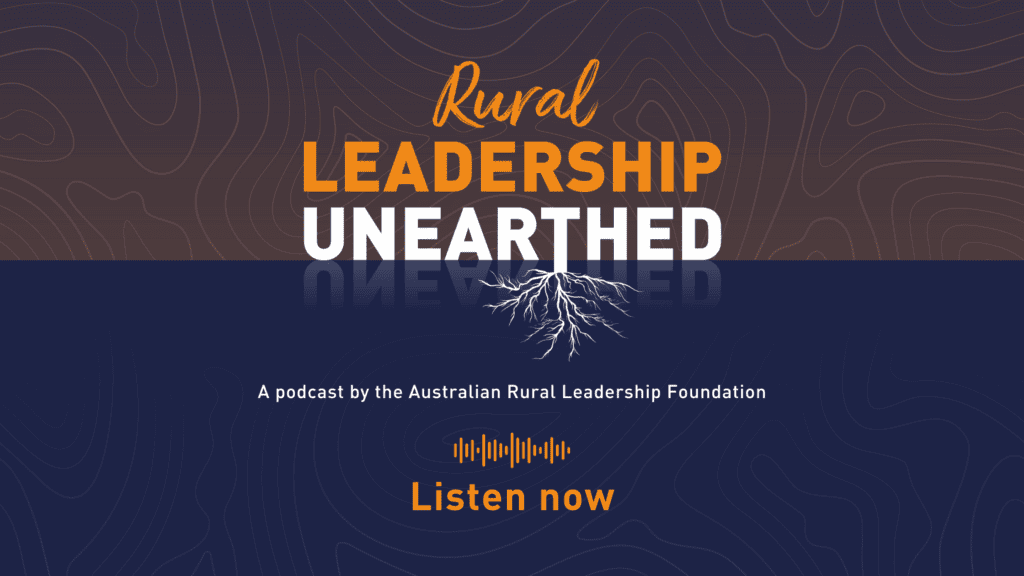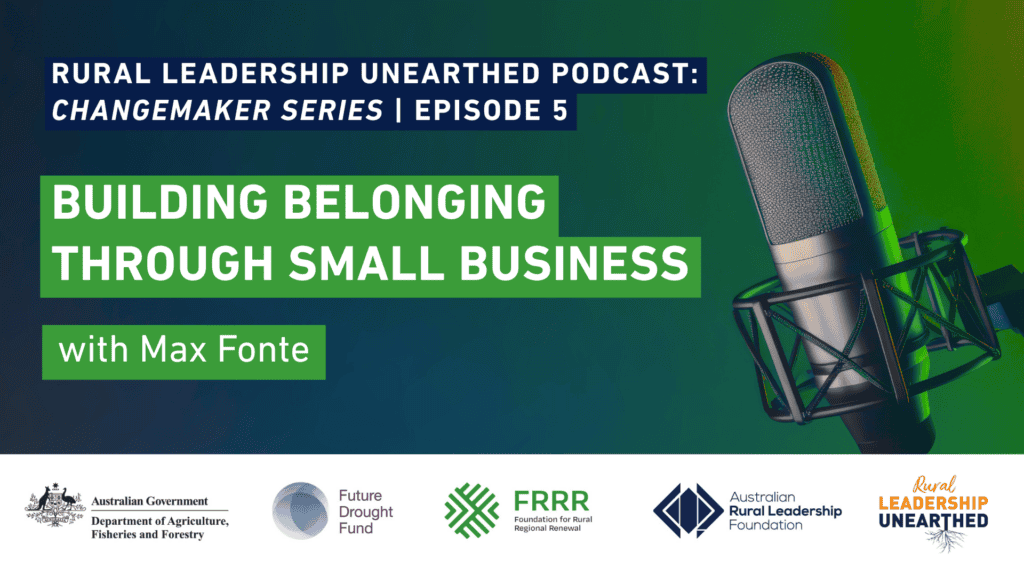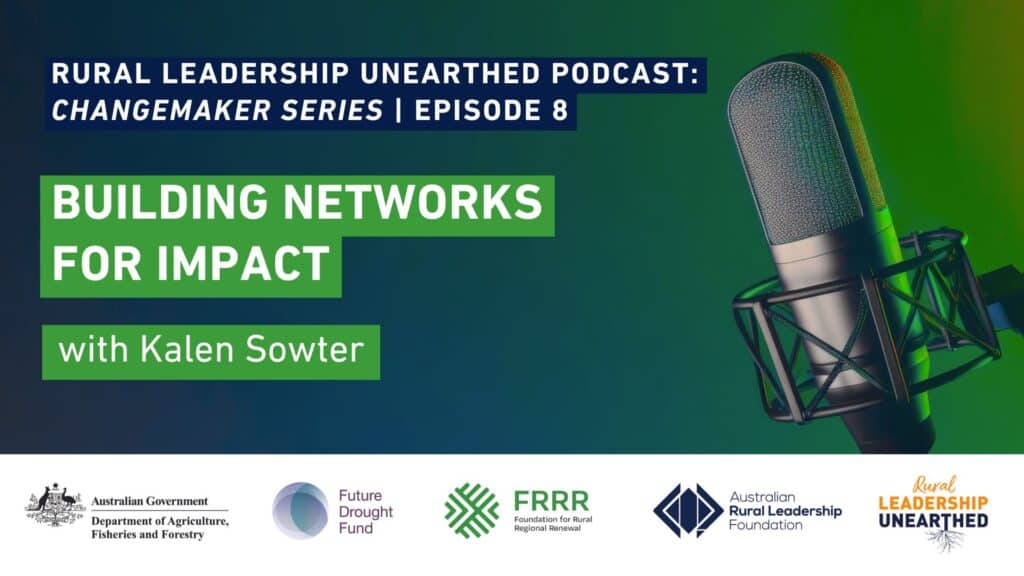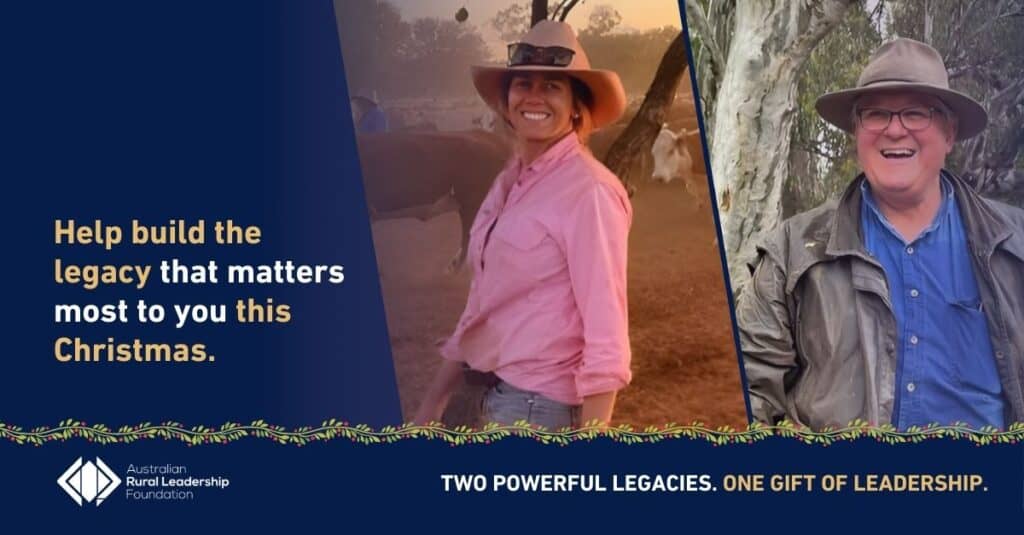When it comes to navigating a disaster on a telecommunications front, it’s easy to assume the response would be complex. Afterall, telecommunications itself can at times overwhelm the lay person.
Yet it’s often the case the most basic needs are what’s needed amid the personal chaos experienced by those directly impacted, on what would probably be the worst day of their life.

Just some of the reflections, and learnings on the job by Telstra’s Steve Tinker.
Heading Telstra’s operations in Northern and Western Victoria and a key member of Telstra’s Response Team, Steve shares his experiences of leading through disasters as part of the ARLF’s first podcast episode – Rural Leadership Unearthed.
He’s not an ARLF alum but with 30 years of leadership with Telstra and leading the response to some of the worst disasters we’ve seen, he’s got plenty of wisdom to share.
The interview timing is also apt, with parts of Australia experiencing cyclones, storm cells, floods and fires in recent weeks. As well, Telstra’s boost in disaster support across the regions.
As one of ARLF’s longest supporters in delivering leadership for positive impact across our regions – and sharing a vision of thriving rural, regional and remote communities – we’re thrilled be featuring Telstra in the launch of the podcast.
Our chief executive Matt Linnegar sat down with Steve in late December for this chat. Here’s an edited extract.
Matt
I understand you’ve been with Telstra for around 30 years which is about as long as the Foundation’s been going. Tell us a bit more about your role and what leadership starts to look like in a role like yours?
Steve
Yeah, I suppose I’ve been around a long time as you said and see a lot of things happening…For us, particularly in regional areas, it’s about ensuring that we communicate very clearly about what’s going on with our networks. If we have the lead up to an event like a cyclone or a flood or something like that, how they (communities) can best prepare, how we’re preparing, and then how we’re responding. I think from a leadership perspective that’s really important because, when we have things going on like disasters and emergencies, people really want to help, which is great, and they want to get involved but it’s really important to be really clear on the roles and functions… making sure that we’re really clear on the role and all working together and pulling in the same direction.
Matt Linnegar
So there’s your day job and what you’re doing for Telstra. And of course, you’d also be very much part of that community yourself. Are you thinking about those multiple roles, multiple hats, and how that starts to play out at times like a disaster?
Steve Tinker
Absolutely it’s a juggle but the one thing you really want to focus on is making that difference to those communities and those people that are particularly in a disaster. They’re probably having their worst day and I keep reminding myself of that and the team of that…and we just need to try and support them the best we can. And sometimes that’s simply just by communicating what’s going on and making sure we’re very clear on that. So yeah, it’s a juggle, but it’s very rewarding as well.
Matt Linnegar
You and your team have supported those communities during some of the worst natural disasters we’ve seen. And in your patch, you would probably go back to what would be the 2009 Black Saturday bushfires, and then of course, more recently floods in the last year or so. You’re reflecting on those different roles that you play, people are having their worst day and what can you do to help them. But what would be one of your biggest reflections about leadership, be that your own or others that you’ve interacted with at times like that?
Steve Tinker
I suppose probably the biggest thing is for me is empathy and care, understand that worst day scenario and I think really understanding that. That really puts you in a real sort of mindset to do what you can to support those people and keep focusing on what’s really the most important things. I actually remember during Black Saturday in particular that I was really surprised at what people really needed in the aftermath…and it was simply that they wanted a phone charger to be able to charge their phone because they just had to get out of wherever they were so they could actually start to communicate to family and friends and get on with things. It seemed like a really simple thing but it was so important. I think that was the thing that sort of struck me, was that we sometimes can overcomplicate things and think people need stuff from afar but when you get on the ground and really understand it, it could be quite different. It was really an eye opening experience and there was a lot of trauma going out but you saw the best of people as well which was very positive.
Matt Linnegar
You’ve seen people who’ve responded in different ways and when these disasters strike, and I’m kind of betting that some of them will be saying ‘look this is almost accidental leadership… I played a role, I did what I thought I had to in the situation, but I’m not a leader here’. And almost a reluctance there. Have you seen that sort of thing before? What’s been your experience on the ground in those times?
Steve Tinker
Yeah, I totally agree. I think there are people that just sort of fall into it and they step up and they probably don’t even realize they’re doing it. But yeah, the experience I’ve seen over many years is that there’s just any number of people that sort of lean into that sort of thing. And they’re generally local people that really care about their community. They may have been really impacted themselves but they’ve got this sort of selfless view of ‘let’s get on with it, let’s support people’ and they’ve got this real optimism in the real dark times which I found really amazing.
I mean, last year, with the Rochester floods, the community there were just incredible, they still are. Their positivity through that, you know, while a horrible time for them, was just remarkable and they sort of created this bow wave that you just wanted to support them because they were so invested in being positive in moving forward. And there was quite a large group of leaders that got on board with that and you felt really motivated to support them and it was really inspiring to see what they were able to achieve in a short period of time by bringing people together. It’s a really positive thing that comes out of real trauma and darkness I suppose in those communities, but it’s something to behold when you sort of reflect on it.
Matt Linnegar
That positivity, that optimism and in times like that, which are absolutely trying for everybody…that’s something that you’ve witnessed, that you’ve been part of which must be inspiring. No doubt there’ll be other times, either in the disaster or indeed afterwards, where it’s very difficult for those who’ve been through that to keep up that air of optimism, to be able to stay positive when the reality sets in about the impact and what’s happened. Have you had that experience there where you’ve been talking to, working with, walking alongside others in the community at times like that and what’s needed from your perspective, when those times hit?
Steve Tinker
It might be a timing thing, I’m not sure, but certainly you see it. There’s a lot of attention that gets thrown at some of these communities in the immediate aftermath when these horrible things happen. But then, months later, that’s when the hard slog happens, and I think that’s when a lot of people disappear and maybe a lot of the effort, you know, seems to have been waning. That’s probably where you really need to focus on doubling down on the effort that you do and particularly communicating on what’s happening so they don’t feel forgotten.
Matt Linnegar
Through all of those experiences, can you think of a time or there might be a couple of different occasions when your own leadership has been tested?
Steve Tinker
Probably a number of times…I suppose probably the key thing there was really calmness, you know, don’t sort of throw everything at it and get into a panic mode. And that’s probably a trait that I’ve seen across leaders in emergency services and others, that they’ve got this amazing calmness about them and they’re able to then think things through. I think that’s probably something I’ve picked up since 2009, is be calm, be listening, be very aware of things, what’s going on and work out what you can do. So yeah there’s lots of things around that leadership perspective that I think I’ve reflected on a lot and what went well and what didn’t go so well. And that’s okay, I think sometimes mistakes will happen…I suppose the first thing we do is make sure our people are safe so we don’t want to make horrendous mistakes. Even thinking about it, there’s certainly a journey you have got to go through as a leader when these things are put in front of you.
Matt Linnegar
The Australian Rural Leadership Foundation has been around for 31 years. And of course, our mission in life is pretty simple – leadership development for rural, regional and remote Australia. Of course, none of that could occur without the support of our many partners across the country and Telstra has been with us for almost all of that 30 odd years of history. And Telstra has sponsored countless participants particularly in our Australian Rural Leadership Program for that period. We also are working with Telstra through graduates and alumni post program – this is after they’ve gone through a leadership program in a range of initiatives that benefit rural and regional Australia. All of that, of course, brings us to Telstra’s disaster response campaign.
Steve looks pretty significant and timely – we’ve just been talking about what’s happening around the country at the moment and indeed, the fact that these disaster events seem to be happening more often and closer together. There are a number of initiatives that are happening and this includes from Telstra themselves. Let’s start with the launch of the Telstra Response Team, which I believe you’re part of. Could you take us through some of those initiatives that are happening as part of that response?
Steve Tinker
We’ve talked about reflection and leadership and how we improve our response, how do we continue to try and drive the benefits for our customers in our communities, and where we work. So we’ve launched what we call the Telstra Response Team, and we’ve had literally 1000s of people readied and supported communities and customers during disasters for many years but we’ve sort of ramped that up a little bit this year in terms of calling it our Telstra response team. We’ve got people that are on the ground, our field technicians ready to be deployed in areas when it’s safe to do so to restore services. They’re pre-deploying equipment where they can to support in the lead up to disasters, and then we’ve got people manning the phones and supporting behind the scenes as well to help our customers.
Then we’ve got a whole range of things that we’re doing to support customers. We’ve had Disaster Assistance packages for customers for a long time now for if they’re impacted by disaster but this year, we’ve automated a fair bit of that so it basically means that if you’re in an area that’s impacted by disaster we will automatically bestow additional data on your on your mobile. So if you are a price paid customer you have got 100 gig of additional data for free to use. And if you’re prepaid, I think it’s 30 gig or something like that. So those sorts of things are important because if you have to leave home you want to be able to still connected to family and friends during that time and you might have practical things you need to do like contacting insurance companies or a whole range of things.
We’re upgrading payphones. Sometimes people don’t see them but they’re really important during emergency times and we’re upgrading the batteries so they last longer with power outages which is usually the first thing that impacts an area. We’re also offering free Wi Fi Internet services off some of the payphones and USB charging so if you need to charge your phone, there’ll be USB charging ports on payphones to be able to do that. There’s 1000 of those being deployed in the next couple of years.
Probably a big one Matt is we’ve reaffirmed our commitment to emergency roaming with the mobile networks. So we’re working with the other mobile network providers to support emergency roaming and this was in early stages but it’s a commitment we’ve made and fundamentally if you go into an area and your host mobile network is not working, you’ll be able to then roam onto any available network in that area if it’s operating. So we think that’s a really positive thing for communities that are potentially impacted by disasters.
We’ve got some support from the federal government under their Strengthening Telecommunications against Natural Disasters fund for generators across the country to help restore and keep our network running in times of disaster which has been fantastic.
And some other equipment like what we call Cell on Wheels and other satellite technology that we can use to help have connectivity in areas that are may be impacted by disasters as well whether the equipment’s been flooded or burned out or things like that, so we can at least deploy some things to keep people connected which is really positive.
So yeah, there’s lots of lots of things happening in this space Matt and we’re really pleased that we’re able to continue to find ways to improve the way that we prepare and the way that we respond to natural disasters for our country which we think is really important.
Matt Linnegar
How can people best help themselves as well? What else could we or should we be doing to prepare for these disasters that are with us now and will continue to be so in the future?
Steve Tinker
From a telecommunications point of view, I think I’ve said before about the one thing I did learn over the years is having the battery charged for your mobile phone is really important. It seems simple but it’s probably the last thing we think about so having a charger or a battery backup for your device as part of your emergency kit is really important. Even things like having a non-electronic list of contact numbers is important because if you do lose power to your phone, not many of us know phone numbers anymore. So that’s another little trick.
There are options around being able to use your mobile phone; if the mobile networks are down you might be able to use Wi Fi calling. If there’s internet available through Wi Fi…you might be at another venue so there are different options around understanding what that looks like. Having that plan is really important and go to the Telstra disaster preparedness page and that will step through some of the tips and tricks around how to best do that from a telecommunications perspective.
Matt Linnegar
Just going to round out talking about you Steve. How do you look after yourself to make sure that you’ve got the energy you need to bring to the role, to bring to leadership at the times you need it?
Steve Tinker
Yeah, I suppose it’s one of the risks we have as leaders…and I think that’s part of having that reflection time to ensure you are looking after yourself and the others around you, particularly your team, to take the time to actually ensure that you’re ready.
You know, I suppose my reflection is that I can’t always be operating at 100 per cent and beyond. And I think sometimes there’s an expectation that we do so I sort of recognize that in myself that it’s okay that I’m not at times. I think some call it operating in your A game or your B game. I’m reasonably good at understanding when I’m in my B game and I’ve got some really good people that I work with that actually really support me and those sorts of things. So that’s really important, to have good people around you.
To catch the full interview, head to: Rural Leadership Unearthed
To find out more about Telstra’s Disaster Response campaign, visit: https://www.telstra.com.au/exchange/disaster-season-upgrades-2023
How to prepare for emergencies: https://www.telstra.com.au/exchange/how-to-prepare-and-stay-connected-during-natural-disaster.
Telstra’s dedicated assistance line: 1800 888 888
To learn more about Telstra’s partnership and impact across our regions through its support, and ARLF alumni, head to: https://rural-leaders.org.au/arlf-and-telstra-are-connecting-rural-leaders-across-the-country/


